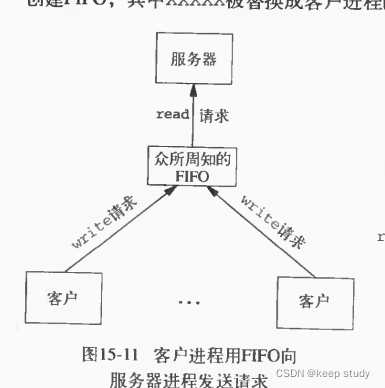进程间通信的方式
1. Pipe fifo 实现最简单
2. mmap 非血缘关系进程间
3. 信号 开销小
4. domain 套接字,稳定性最好
使用本地套接字,实现一个本地服务器和多个客户端之间通信
类似

server 作为服务器,接收客户端的数据,保存每个客户端的fd,实现和客户端的双向通信。
#include <stdio.h>
#include <unistd.h>
#include <sys/socket.h>
#include <strings.h>
#include <string.h>
#include <ctype.h>
#include <arpa/inet.h>
#include <sys/un.h>
#include <stddef.h>
#include <stdio.h>
#include <string.h>
#include <arpa/inet.h>
#include <pthread.h>
#include <ctype.h>
#include <unistd.h>
#include <fcntl.h>
#include <string.h>
#include "wrap.h"
#define MAXLINE 8192
#define SERV_PORT 8000
#define SERV_ADDR "serv.socket"
//数据的类型
enum TYPE
{
START,
KEY,
USB
};
//struct buffer{
char from[2];
char to[2];
int type;
char str[3];
//};
struct s_info { //定义一个结构体, 将地址结构跟cfd捆绑
struct sockaddr_un cliaddr;
int connfd;
};
/*
为了适应多进程之间的通信,定义的传递的格式
form+to+type+内容
form: 1个字节 那个客户端发来的数据
to: 1个字节 发给谁,可以给服务器,也可以给别的客户端
type:1个字节 数据类型
// size: 内容的长度 //因为内容比较少,所以不要大小
内容:
*/
//保存客户端的名称+fd
struct s_id{
char name[4];
int fd;
};
//客户端名称+fd
struct s_id id[4] = {
{"A", -1},
{"B", -1},
{"C", -1},
{"D", -1},
};
void *do_work(void *arg)
{
#if 1
int n,i;
struct s_info *ts = (struct s_info*)arg;
char buf[MAXLINE];
char str[INET_ADDRSTRLEN]; //#define INET_ADDRSTRLEN 16 可用"[+d"查看
while (1) {
#if 1
n = Read(ts->connfd, buf, MAXLINE); //读客户端
if (n == 0) {
printf("the client %d closed...\n", ts->connfd);
break; //跳出循环,关闭cfd
}
printf(" n = %d, client bind filename %s\n", n, ts->cliaddr.sun_path);
#if 1
from[0] = buf[0];
from[1] = '\0';
to[0] = buf[1];
to[1] = '\0';
type = buf[2]-'0';
printf("from = %s \n", from);
printf("to = %s \n", to);
printf("type = %d\n", type);
if(strcmp(to, "s") == 0){ //发数据给server的
if(type == START){//开始登陆信号
printf("start type = %d\n", type);
for(i=0;i<4;i++){
if (strcmp(from,id[i].name) == 0 ){
id[i].fd = ts->connfd;
printf("i = %d, fd = %d \n", i, ts->connfd);
}
}
}
else if(type == KEY){
int key = buf[3] - '0';
printf("key = %d \n", key);
}
else if(type == USB ){
}
}
#endif
for (i = 0; i < n; i++)
{
buf[i] = toupper(buf[i]); //小写-->大写
}
Write(STDOUT_FILENO, buf, n); //写出至屏幕
Write(ts->connfd, buf, n); //回写给客户端
#else
n = Read(ts->connfd, buf, MAXLINE); //读客户端
if (n == 0) {
printf("the client %d closed...\n", ts->connfd);
break; //跳出循环,关闭cfd
}
#endif
}
Close(ts->connfd);
#endif
return (void *)0;
}
int main(void)
{
int lfd, cfd, len, size, i;
struct sockaddr_un servaddr, cliaddr;
char buf[4096];
struct s_info ts[10];
pthread_t tid;
lfd = Socket(AF_UNIX, SOCK_STREAM, 0);
bzero(&servaddr, sizeof(servaddr));
servaddr.sun_family = AF_UNIX;
strcpy(servaddr.sun_path,SERV_ADDR);
len = offsetof(struct sockaddr_un, sun_path) + strlen(servaddr.sun_path); /* servaddr total len */
unlink(SERV_ADDR); /* 确保bind之前serv.sock文件不存在,bind会创建该文件 */
Bind(lfd, (struct sockaddr *)&servaddr, len); /* 参3不能是sizeof(servaddr) */
Listen(lfd, 20);
printf("Accept ...\n");
while (1) {
len = sizeof(cliaddr);
cfd = Accept(lfd, (struct sockaddr *)&cliaddr, (socklen_t *)&len);
len -= offsetof(struct sockaddr_un, sun_path); /* 得到文件名的长度 */
cliaddr.sun_path[len] = '\0'; /* 确保打印时,没有乱码出现 */
ts[i].cliaddr = cliaddr;
ts[i].connfd = cfd;
/* 达到线程最大数时,pthread_create出错处理, 增加服务器稳定性 */
pthread_create(&tid, NULL, do_work, (void*)&ts[i]);
pthread_detach(tid); //子线程分离,防止僵线程产生.
i++;
}
return 0;
}
client
#include <stdio.h>
#include <unistd.h>
#include <sys/types.h>
#include <sys/socket.h>
#include <strings.h>
#include <string.h>
#include <ctype.h>
#include <arpa/inet.h>
#include <sys/un.h>
#include <stddef.h>
#include "wrap.h"
#define SERV_ADDR "serv.socket"
#define CLIE_ADDR "clie.socket"
int main(void)
{
int cfd, len;
struct sockaddr_un servaddr, cliaddr;
char buf[4096];
cfd = Socket(AF_UNIX, SOCK_STREAM, 0);
bzero(&cliaddr, sizeof(cliaddr));
cliaddr.sun_family = AF_UNIX;
strcpy(cliaddr.sun_path,CLIE_ADDR);
len = offsetof(struct sockaddr_un, sun_path) + strlen(cliaddr.sun_path); /* 计算客户端地址结构有效长度 */
unlink(CLIE_ADDR);
Bind(cfd, (struct sockaddr *)&cliaddr, len); /* 客户端也需要bind, 不能依赖自动绑定*/
bzero(&servaddr, sizeof(servaddr)); /* 构造server 地址 */
servaddr.sun_family = AF_UNIX;
strcpy(servaddr.sun_path,SERV_ADDR);
len = offsetof(struct sockaddr_un, sun_path) + strlen(servaddr.sun_path); /* 计算服务器端地址结构有效长度 */
Connect(cfd, (struct sockaddr *)&servaddr, len);
while (fgets(buf, sizeof(buf), stdin) != NULL) {
write(cfd, buf, strlen(buf));
len = read(cfd, buf, sizeof(buf));
write(STDOUT_FILENO, buf, len);
}
close(cfd);
return 0;
}